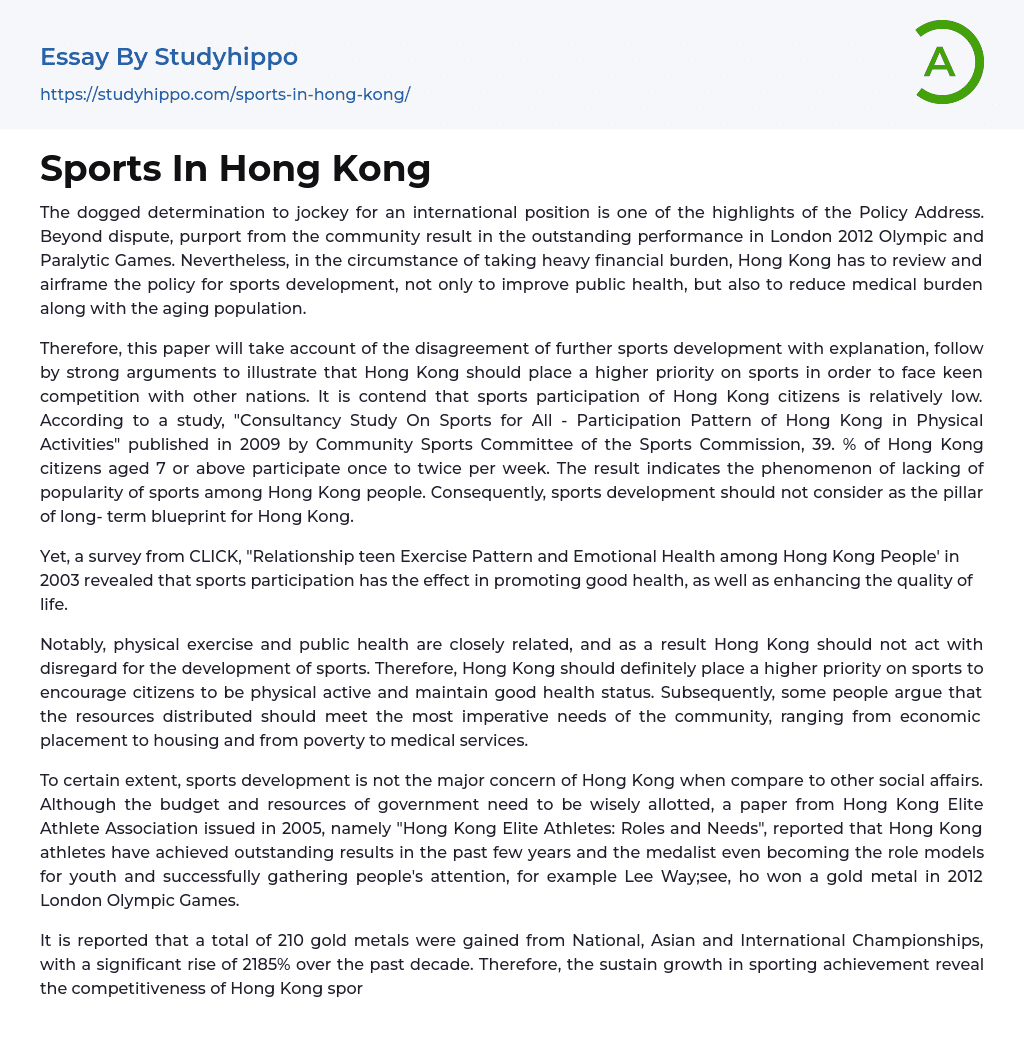The Policy Address highlights the need for Hong Kong to gain an international position in sports, despite the financial burdens caused by successful London 2012 Olympic and Paralytic Games. Improving public health and reducing medical burden are crucial factors for reviewing sports development policies, especially with an aging population. With low sports participation among Hong Kong citizens noted by a 2009 study conducted by the Community Sports Committee of the Sports Commission, this paper argues that prioritizing sports is essential to better compete with other nations in the long-term blueprint for Hong Kong. Participating in sports can promote good health and improve quality of life according to a 2003 survey by CLICK titled "Relationship Teen Exercise Pattern and Emotional Health Among Hong Kong People." Thus, prioritizing sports development is vital to encourage ph
...ysical activity and maintain good health among its citizens. However, some argue that resources should be allocated based on community needs such as economic placement, housing, poverty, and medical services.
Although sports development may not be the primary concern in Hong Kong compared to other social issues, there have been impressive achievements by Hong Kong athletes in recent years. According to a 2005 paper by the Hong Kong Elite Athlete Association titled "Hong Kong Elite Athletes: Roles and Needs", medalists such as Lee Way have become role models for youth and gained attention. Thus, it is important for Hong Kong to allocate its budget and resources wisely while still prioritizing sports development. As per the report, over the past decade, Hong Kong sports achieved 210 gold medals in National, Asian and International Championships – which is an increase of 2185%. This sustained
growth highlights the competitiveness of Hong Kong on a national level, emphasizing the benefits of prioritizing sports to foster high-performance sports within Hong Kong. This will help attain a higher position in the sporting field. However, land scarcity remains an obstacle for further sports development hindering entrepreneurial opportunities and limiting social & economic progress. Nonetheless, according to the 2013 Policy Address, substantial effort has been made by the government towards developing Sports Institutes like HIS (Hong Kong Sports Institute) that has undergone reconstruction/renovation along with construction underway at Mute-purpose Sports Complex (MASC.) located at Aka Take indicating positive support towards sports developments despite challenges faced due to lack of space.According to a 2009 study by the Community Sports Committee of the Sports Commission, less than half of those interviewed believed that sports facilities were sufficient, with 39% finding them inadequate. This is in contrast to countries like Brazil and the United Kingdom where being an athlete can be a career choice. The inadequacy of public facilities hinders local athletes' performance and results in a lack of competitive edge in international races. Therefore, there is a need for prioritizing sports by constructing more professional facilities for both public use and player training. However, this may come with economic sacrifices as it requires significant capital investment such as building infrastructure, providing human resources, disseminating event information, and promotional expenses. This makes it challenging for beginners in sports development to reach a breaking point. Additionally, there is intense debate on whether Hong Kong should bid to host the 2023 Asian Games due to concerns about its potential negative impact on economic growth. Despite these concerns, further sports development
would benefit Hong Kong's status and tourism in the long term.According to research conducted in 2014 by The Statistic Portal on "International Sports Federations marketing revenue receipts from Olympic summer games 1992 to 2012", there has been a consistent increase in revenue generated from the Olympic Games every year. The report shows that the 2012 London Olympic Games earned a total of $519 million LOS dollars. It has also been demonstrated, through Legal's "Financial and Economic Assessment of the Proposed 2023 Asian Games in Hong Kong" report, that hosting international sporting events can have positive impacts such as enhancing reputation and improving social cohesiveness. Therefore, it is clear that sports development should not be underestimated for its economic and reputational benefits.
In conclusion, participating in sports is beneficial for overall wellness and physical health, with exercise playing an important role in maintaining good health. Prioritizing sports is essential for promoting high-performance sport in Hong Kong, but due to inadequate availability of facilities for local citizens and athletes additional resources are required. Although there may be short-term economic losses associated with investing in sports development, these are outweighed by the long-term positive effects on Hong Kong's economy and image.
- Anatomy and Physiology essays
- Addiction essays
- Biodegradation essays
- Dental Care essays
- Disease essays
- Disorders essays
- Health Care essays
- Intelligence Quotient essays
- Nutrition essays
- Olfaction essays
- Public Health essays
- Women's Health essays
- World health organization essays
- Cancer essays
- Infectious Disease essays
- Lung Cancer essays
- Neurology essays
- Physical Exercise essays
- Medicine essays
- Sex essays
- Inquiry essays
- Disability essays
- Poison essays
- Action Potential essays
- Nervous System essays
- Childbirth essays
- Puberty essays
- Blood essays
- Kidney essays
- Neuron essays
- Body essays
- Glucose essays
- Sense essays
- Heart essays
- Skeleton essays
- Human Physiology essays
- Eye essays
- Immune System essays
- Muscle essays
- Skin essays
- Brain essays
- Central Nervous System essays
- Human Skin Color essays
- Digestive System essays
- Common sense essays
- Respiration essays
- alcoholism essays
- Smoking essays
- Casino essays
- Tobacco essays




